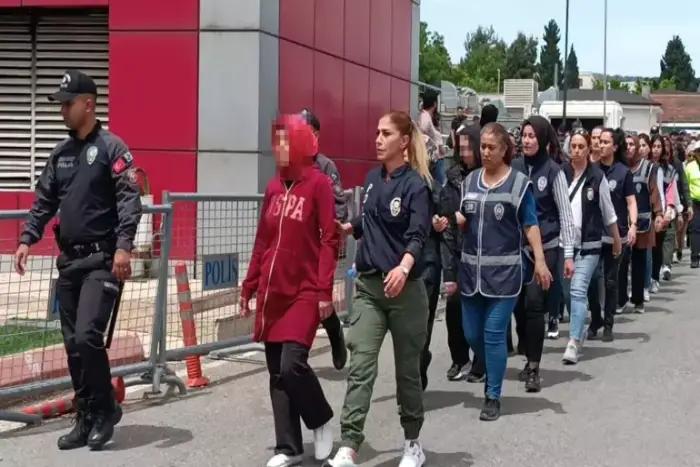Seventy-seven people, including dozens of female students, have been jailed pending trial in southeastern Turkey following a mass detention targeting alleged followers of the faith-based Gülen movement, according to the TR724 news website.
The arrests came after a police operation launched on May 6 across 47 provinces, centered in Gaziantep. Interior Minister Ali Yerlikaya initially announced the detention of 208 individuals, most of them university students and recent graduates. That number later rose to 320, according to defense lawyers.
The court released 125 of the detainees under judicial supervision, which includes a travel ban and requires them to regularly check in at a police station.
A leaked interrogation file obtained by Turkish Minute shows that the detainees were questioned about a wide range of constitutionally protected and otherwise lawful activities. These include attending certain high schools or universities, staying in student dormitories, traveling abroad for educational programs and even having passports or driver’s licenses. Legal experts say such questions point to a pattern in which Turkish authorities treat peaceful, routine behavior as evidence of terrorism.
Among those ordered jailed by the Gaziantep Criminal Court of Peace are two students from Middle East Technical University (ODTÜ), one a theology student, a young woman with epilepsy, as well as a recent graduate suffering from a heart condition, TR724’s Sevinç Özarslan reported. The students are aged between 19 and 24. Court hearings are ongoing, and the number of individuals remanded in custody is expected to increase.
The police are also asking questions about participants’ international travel, including who paid for their trips, who accompanied them, where they stayed, and whether they attended any summer camps in countries such as Bosnia, Albania, North Macedonia, Georgia or northern Iraq. Many of these trips took place years ago and were organized as part of education programs that were lawful at the time.
The questioning extends to social media use and digital activity. Detainees have been asked about messaging apps like Signal or Jitsi, whether they have cryptocurrency wallets, and whether they made donations under Islamic concepts such as “zakat,” “infak,” or “himmet.” Prosecutors have cited such donations in the past as alleged financial support to a terrorist organization.
One question in the file explicitly asks if the detainee wishes to benefit from Article 221 of the Turkish Penal Code, also known as the “effective remorse” clause. The provision allows sentence reductions in exchange for confessions and cooperation with authorities.
A number of those jailed come from families already targeted in earlier crackdowns. TR724 reported that in one case, a student whose sister died from stomach cancer while their father was imprisoned was taken into custody in Denizli. Fourteen female students from the same city were detained in similar raids.
The operation also targeted businesspeople. Among those referred to court was Taner Nakıboğlu, a former executive at Naksan Holding who had previously served a prison sentence. The company was seized by the Turkish government under emergency rule following a 2016 coup attempt.
Yerlikaya released a video on social media portraying home visits by headscarved women as part of a terrorist network, claiming the suspects had organized “domestic and international meetings” and participated in “foreign education camps.” Critics say the framing criminalizes normal religious and educational activity, including acts as mundane as studying abroad or living in the same apartment as a relative of a purged civil servant.
Ömer Faruk Gergerlioğlu, a lawmaker from the pro-Kurdish Peoples’ Equality and Democracy Party (DEM Party) and a prominent human rights advocate, condemned the operation in a video posted on X. “In this country, traveling abroad has become a crime! Going on a tourist trip has become a crime!” he said. “Where are you trying to drive these young people, what are you trying to do?”
Since the failed coup in 2016, Turkish authorities have arrested tens of thousands of people over alleged ties to the Gülen movement, which the government designates a terrorist group despite no consensus among international bodies.
Over the last decade, Islamic scholar Fethullah Gülen, who died in October, and his movement, which once operated a vast international network of schools and dialogue programs, have faced severe repression. The Turkish government labeled the group as a terrorist organization in 2016, claiming it was behind the coup attempt, an accusation Gülen and his followers have consistently denied.
According to a statement by Justice Minister Yılmaz Tunç in July 2024, more than 705,000 people have been investigated for alleged Gülen links since 2016, with over 13,000 either jailed pending trial or serving prison sentences. Those figures have likely increased over the past 10 months as the crackdown continues, with President Recep Tayyip Erdoğan vowing there will be no “slackening” following the cleric’s death at age 83.
Turkey is a member of the Council of Europe and a signatory to the European Convention on Human Rights. However, watchdog groups such as Human Rights Watch and Amnesty International have repeatedly warned that Ankara’s use of terrorism charges violates basic legal standards and is often used to suppress dissent and silence civil society.

